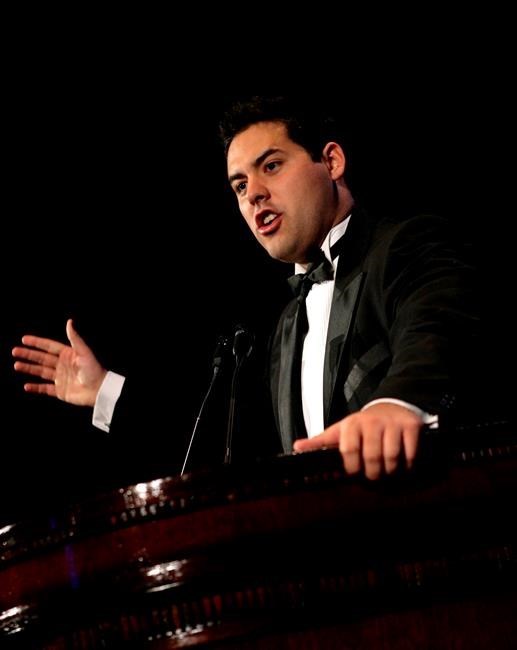
FILE - In this May 15, 2008 file photo, Yon Goicoechea speaks before accepting the Milton Friedman Prize for Advancing Liberty in New York. Venezuela's government has released two prominent opposition activists it has held for more than a year without trial, one of them a Spanish citizen, as President Nicolas Maduro looks to ease international pressure following months of unrest. Goicoechea and Delson Guarate were freed late Friday, Nov. 3, 2017, from a Caracas jail, but continue to be bound by restrictions on their movement and speech, according to lawyers’ co-op Foro Penal. (AP Photo/Seth Wenig)
Republished November 28, 2017 - 4:24 PM
Original Publication Date November 04, 2017 - 6:01 AM
CARACAS, Venezuela - In a story Nov. 4 about the release from jail of two prominent opposition activists in Venezuela, The Associated Press erroneously reported that the number of jailed activists barely surpassed 100 when President Nicolas Maduro took office in 2013. There were fewer than a dozen such detainees at the time, according to the head of the Venezuelan lawyer co-op Foro Penal.
A corrected version of the story is below:
Venezuela's government has released two prominent opposition activists it has held for more than a year without trial, one of them a Spanish citizen, as President Nicolas Maduro looks to ease international pressure following months of unrest.
Yon Goicoechea and Delson Guarate were freed late Friday night from a Caracas jail, but continue to be bound by restrictions on their movement and speech, according to lawyer co-op Foro Penal.
"I'm free," Guarate wrote in a concise message posted on his Twitter account.
Maduro's government has been releasing about 15 jailed opponents per week since consolidating its power after the election of a constitutional assembly in July, according to Foro Penal.
Opposition leaders backed by several foreign governments have been demanding for more than a year the release of political prisoners as a pre-condition for talks with the government. But Alfredo Romero, head of Foro Penal, said the latest releases are a face-saving measure by Maduro aimed at appeasing his foreign critics now that the protest movement blamed for more than 120 deaths has subsided.
Romero said the number of jailed activists in Venezuela was less than a dozen when Maduro took office in 2013, but that number skyrocketed to 676 at the height of anti-government protests against the constitutional assembly in July.
After the latest releases, around 360 people remain jailed, he said.
"This isn't a negotiation with the opposition about getting something in return," said Romero. "It's about the high political cost of having such an elevated number of political prisoners."
There was no immediate reaction from the government.
But authorities have long denied they are keeping prisoners of conscience and have accused its opponents of working with the U.S. to sabotage Venezuela's economy and pave the way for the socialist leader's removal in a coup. In releasing its opponents, the government said it wants to create conditions for dialogue and reconciliation under the authority of the constitutional assembly, which is made up entirely of government supporters after the opposition boycotted elections to choose its delegates.
Goicoechea, 32, had been a leader of student protest movements before leaving Venezuela in 2013 to study at Columbia University. He returned home in 2016 to help organize a recall referendum against Maduro, but the effort was cut short when he was stopped in his car by the Sebin intelligence police and later accused on television by socialist party leader Diosdado Cabello of transporting explosives.
He was given Spanish citizenship while detained, and former Spanish Prime Ministers Felipe Gonzalez and Jose Maria Aznar were involved in his legal defence.
Critics held out his case as an example of Venezuela's slide toward dictatorship after the Sebin ignored a judge's order issued more than a year ago to release him.
"For me, as for so many other Venezuelans, political imprisonment has been the punishment for daring to dream of a democratic society," he wrote from jail in a New York Times op-ed in September. "We just want what so many other people around the world take for granted: free elections, good governance, free expression, judicial independence, personal security and a modicum of economic liberty."
Guarate, the mayor of a small town in Aragua state, was arrested on the eve of a demonstration in Caracas in 2016 on suspicions of terror financing and conspiracy.
Both Goicoechea and Guarate are members of the hard-line Popular Will party founded by Leopoldo Lopez, who had been Venezuela's most prominent jailed activist until he was released and placed under house arrest earlier this year. Lopez was sentenced to 13 years in jail on crimes of inciting violence connected to anti-government protests in 2014, in what was widely condemned by the U.S. and other foreign governments as a political show trial.
Even as authorities empty out Venezuela's jails of opponents, members of Lopez's party remain at risk.
On Friday, the government-stacked Supreme Court blocked Lopez's top deputy, congressman Freddy Guevara, from leaving the country and requested that the constitutional assembly strip his immunity from prosecution on suspicions of instigating unrest during this year's protests.
News from © The Associated Press, 2017